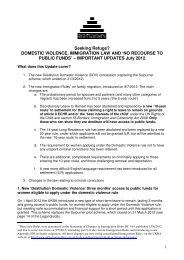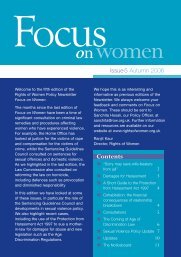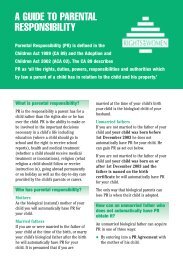Seeking Refuge? - Rights of Women
Seeking Refuge? - Rights of Women
Seeking Refuge? - Rights of Women
You also want an ePaper? Increase the reach of your titles
YUMPU automatically turns print PDFs into web optimized ePapers that Google loves.
• any unpublished documents that they refer to<br />
in their refusal; and<br />
• a record <strong>of</strong> your asylum interview.<br />
The AIT may tell the Home Office to do this by a<br />
particular day, otherwise it must be done as soon<br />
as possible and no later than 2pm on the working<br />
day before the date <strong>of</strong> any hearing. This hearing<br />
will usually be the Case Management Review<br />
Hearing (see below).<br />
It is important that your legal representative<br />
checks that the information given by the Home<br />
Office includes all <strong>of</strong> the documents and evidence<br />
that you gave them as part <strong>of</strong> your claim for<br />
protection, and that you want to rely on in your<br />
appeal. If the Home Office does not produce a<br />
document that you want to rely on, you should<br />
give it to the AIT yourself.<br />
In addition to this exchange <strong>of</strong> information, your<br />
legal representative will also arrange for other<br />
documents, such as any witness statements or<br />
expert reports, to be given to the AIT and the<br />
Home Office. Your legal representative may also<br />
do other things to prepare your case, including:<br />
• Instructing experts to give evidence for you.<br />
• Researching the situation in your country.<br />
• Looking at other determinations made by the<br />
AIT that are relevant to you and your country.<br />
• Instructing a barrister (see above) to advise on<br />
the preparation <strong>of</strong> your appeal and represent<br />
you.<br />
Most asylum appeals will have a Case<br />
Management Review Hearing arranged within<br />
a couple <strong>of</strong> weeks <strong>of</strong> the AIT receiving your notice<br />
<strong>of</strong> appeal.<br />
The purpose <strong>of</strong> the Case Management Review<br />
Hearing is to make sure that your appeal is<br />
prepared properly, and that both your<br />
representative and the Home Office have the<br />
information that they need. Practical issues, such<br />
as whether you need an interpreter at your<br />
appeal, should also be decided at this hearing.<br />
The date <strong>of</strong> the appeal hearing itself will also be<br />
set. How long you will have to wait before your<br />
appeal is heard will depend on the number <strong>of</strong><br />
cases that a particular AIT has to deal with. If you<br />
have a legal representative, you do not need to<br />
attend the Case Management Review Hearing if<br />
he or she is attending, although you may do so if<br />
you would like to.<br />
Evidence at your appeal<br />
At your appeal, you can rely on any evidence that<br />
is relevant to your case. This could be evidence<br />
from witnesses, documentary evidence or what<br />
you say about why you need protection in the UK.<br />
If you have documents that are not written in<br />
English, these must be properly translated. It is<br />
also a good idea to bring any original documents<br />
that you have with you to the appeal, so that you<br />
can show them to the Immigration Judge.<br />
At the appeal hearing<br />
Appeals in the Asylum and Immigration Tribunal<br />
(the AIT) are heard in places across the UK,<br />
including in detention centres. You will be told<br />
when and where your appeal will be held. It is<br />
extremely important to attend your appeal as, if<br />
you do not, it may go ahead without you. If there<br />
is some reason why you are not able to attend<br />
your appeal, for example, because you are<br />
seriously ill, you must contact your legal<br />
representative and the AIT as soon as possible.<br />
In addition to the Immigration Judge or Judges<br />
(and any other tribunal members) the following<br />
people usually attend appeals:<br />
• You and your legal representative (if you are<br />
appealing from outside the UK, it will just be<br />
your legal representative who attends on your<br />
behalf).<br />
• Your interpreter, if you need one.<br />
• A representative <strong>of</strong> the UK Border Agency<br />
called a Home Office Presenting Officer. This<br />
will usually be a different person from the caseowner<br />
in the UK Border Agency who made the<br />
initial decision in your case.<br />
• Any experts that are giving evidence, for<br />
example, a doctor who wrote a report on<br />
injuries that you received, or on the situation in<br />
your country <strong>of</strong> origin.<br />
• Any witnesses that you have.<br />
For many people, attending an appeal is frightening.<br />
It is therefore important to discuss anything that you<br />
are not sure about, or do not understand, before or<br />
during the hearing, with your legal representative.<br />
Your legal representative will also be able to tell you<br />
how to prepare for the hearing.<br />
50
















